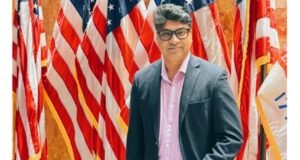
The Bank of England boss has said it needs to “see more evidence” that price rises have slowed further before cutting interest rates.
Andrew Bailey said he was “optimistic that things are moving in the right direction” as rates were held at 5.25%.
He said the Bank expected inflation, which measures the rate prices rise at, would fall “close” to its target level in the next couple of months.
It paves the way for an interest rate cut as early as June.
But Mr Bailey warned a cut was “not a fait accompli, it’s not a done deal”.
August or September appear to be the most likely timing, especially if inflation falls as expected.
The interest rate set by the Bank dictates the rates set by High Street banks and money lenders. Rates are currently at their highest level for 16 years which has meant people are paying more to borrow money for things such as mortgages and loans, but savers have also received better returns.
Mr Bailey said there had been “encouraging news” on inflation, currently at 3.2%, but said the Bank needed “more evidence” it would stay low before cutting rates.
However, at the news conference following the Bank’s decision, Mr Bailey said it was “likely that we will need to cut bank rates over the coming quarters” and by more than financial markets are currently predicting.
The nine-strong Monetary Policy Committee, which votes on rates, appeared to be edging closer towards a cut with two voting for reducing rates and the remaining seven for hold.
The Bank was more positive on the prospects for the UK economy in its latest forecast, predicting
Chancellor Jeremy Hunt said he would “much rather” policymakers “wait until they are absolutely sure” inflation was falling than “rush into a decision that they had to reverse at a later stage”.
But he added that it was encouraging to see “real optimism” from Mr Bailey for the first time.
But Darren Jones, shadow chief secretary to the Treasury, said while it was the Bank of England’s “independent right” to set interest rates, it was “bad news for people at home having to reset their mortgages for the years ahead at a more expensive rate and people to have to pay rent for their homes”.
The health of UK economy has been in the spotlight with economic policies likely to be a key battleground in the quest for votes in the upcoming election, expected by the end of this year.
Asked on Thursday if the economy had turned a corner, Mr Bailey said: “All the evidence we see is that we have turned a corner from that.” But he warned that it was not a “strong recovery”.
 Weekly Bangla Mirror | Bangla Mirror, Bangladeshi news in UK, bangla mirror news
Weekly Bangla Mirror | Bangla Mirror, Bangladeshi news in UK, bangla mirror news







